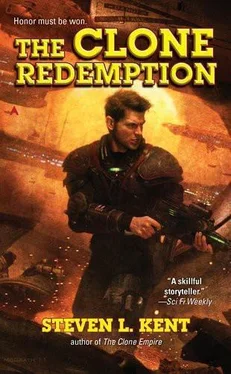Steven Kent - The Clone Redemption
Здесь есть возможность читать онлайн «Steven Kent - The Clone Redemption» весь текст электронной книги совершенно бесплатно (целиком полную версию без сокращений). В некоторых случаях можно слушать аудио, скачать через торрент в формате fb2 и присутствует краткое содержание. Жанр: Боевая фантастика, на английском языке. Описание произведения, (предисловие) а так же отзывы посетителей доступны на портале библиотеки ЛибКат.
- Название:The Clone Redemption
- Автор:
- Жанр:
- Год:неизвестен
- ISBN:нет данных
- Рейтинг книги:4 / 5. Голосов: 1
-
Избранное:Добавить в избранное
- Отзывы:
-
Ваша оценка:
- 80
- 1
- 2
- 3
- 4
- 5
The Clone Redemption: краткое содержание, описание и аннотация
Предлагаем к чтению аннотацию, описание, краткое содержание или предисловие (зависит от того, что написал сам автор книги «The Clone Redemption»). Если вы не нашли необходимую информацию о книге — напишите в комментариях, мы постараемся отыскать её.
The Clone Redemption — читать онлайн бесплатно полную книгу (весь текст) целиком
Ниже представлен текст книги, разбитый по страницам. Система сохранения места последней прочитанной страницы, позволяет с удобством читать онлайн бесплатно книгу «The Clone Redemption», без необходимости каждый раз заново искать на чём Вы остановились. Поставьте закладку, и сможете в любой момент перейти на страницу, на которой закончили чтение.
Интервал:
Закладка:
“I’ve put some thought into this,” I told Holman. “I think we can draw their navy away.”
“How do you suggest we draw them away?”
“By invading Earth,” I said. “It’s time we went on the attack.”
Both Sweetwater and Breeze took the call. They had the lab to themselves.
“You want us to send a team to Terraneau to survey the planet? That could present a problem,” said Sweetwater. He looked tired. His face, which generally had a ruddy complexion, now had a grayish pallor. The bags under his eyes had darkened so that they looked like bruises. “We could probably get away with running remote tests from a satellite, but a certain Mr. Andropov is going to ask questions if we send an explorer.”
The dwarf was right, but I did not see any other options. “What can you get from your satellites?”
“We won’t be able to determine sustainability,” Sweetwater admitted. “We’d need soil samples for that. We can certainly determine oxygen and radiation levels. You probably already have those.”
“We need to know about drinking water and farms,” I said.
“You will need filtration equipment for potable water,” said Sweetwater. “The ash in the atmosphere is a pollutant. The lakes are contaminated, but they’re not especially toxic.”
“We have enough food to last six months. After that, the colonists will starve if they can’t raise their own food,” I said.
Sweetwater shook his head. “We’d suggest taking them to Earth, but we’ll need to evacuate Earth soon.”
“You can worry about that next month; right now, let’s talk about Terraneau,” I said.
“There is no way to test the water without landing a team,” said Breeze.
“Even if we authorized the work, we’d never persuade the U.A. Academy to land a team out there,” Sweetwater said, still referring to himself as “we.” “Andropov doesn’t trust us. The Linear Committee just sent a team of auditors to check our work.”
“That’s a problem,” I said.
“You have a spy ship, maybe you could gather samples,” Breeze suggested.
I shook my head. “The Unifieds would spot our transports.”
Breeze, tall and skinny and alien in appearance with bugeyed glasses, stared into the camera as I spoke, desperation showing in his magnified eyes.
“If they don’t trust you, they may be listening in on us now,” said Freeman.
“Not on our side, they aren’t,” Sweetwater said. “We devised a secure communications console.”
How does that work? I wondered. William Sweetwater, the virtual person, could only build a virtual communications console using virtual parts provided to him by the Unified Authority. One way or another, this communication had to loop through real hardware. Outside his virtual satellite station, Sweetwater would have no control.
“We could send explorers to all of the planets,” said Breeze.
“What?” asked Sweetwater.
“They might suspect something if we tested sustainability on Terraneau, but what if we sent teams to New Copenhagen, Olympus Kri, Gobi, Solomon, Nebraska Kri, and Bangalore.”
Funny thing. When Breeze mentioned Solomon, a shock ran through me. I became dizzy and fell back in my chair.
“Solomon is a confirmed kill?” I asked, though I should have known.
Sweetwater stared into the camera, no emotion on his face, and said, “That is affirmative.”
I did not ask about survivors, I knew the answer.
“We can say we are running tests on all seven planets,” said Breeze. “We can tell them we need to start searching for a suitable place.” He meant a suitable place for the population of Earth.
I played with the idea in my head, looking at it from every direction to see if I could poke holes in it. The idea held water. “They haven’t started searching?” I asked.
“We think they have,” said Sweetwater, “but they haven’t informed us about their progress.”
“How will they react if you suggest a survey?” I asked.
Sweetwater considered the idea for several seconds. The plan was not without its risks. If Tobias Andropov already suspected Sweetwater and Breeze of collusion, he might see the tests as absolute proof.
Sweetwater sat on his tall stool, staring into the camera. One moment his face flushed with anger. He might have been more worried about his own arguable existence than the millions of lives spread out across our last remaining worlds. Then he smiled, and said, “Brilliant. Even an idiot like Andropov will recognize the importance of creating an evacuation plan.”
CHAPTER FORTY-SIX
We were running reconnaissance. For the mission, we took the spy ship.
I asked Don Cutter to captain the ship. He had time on his hands. Mars and his Corps of Engineers had not even begun working on the Churchill ; and, now that Holman was running the Navy, he did not have time to play chauffeur.
If we’d broadcasted in behind Jupiter or Saturn, we might have come in undetected; but Jupiter was four hundred million miles from Earth and Saturn was eight hundred million miles away. Even flying balls-out, at thirty-nine million miles per hour, it would have taken twenty hours to cover that distance, and we did not have a day to spare.
We broadcasted in behind Mars, knowing that the Unifieds had figured out that trick. They might detect our entrance, but that did not necessarily translate into their tracking our route. The moment we entered the Sol System, Cutter engaged the stealth generator, and our spy ship became invisible …we hoped.
In the old moon-shot and satellite days, navigators planned trajectories that curved around the sun as they plotted routes from Earth to Mars. Back in that day, spaceships traveled only twenty-four thousand miles in an hour. At fifteen hundred times that speed, we took a more direct approach, pausing to add the occasional curve to make our route less predictable.
I stood on the bridge beside Captain Cutter, staring out the viewport. I’d known this man for only a month, but we had the familiarity of the battlefield. We’d faced death together. In military circles, that made us family.
“Do you think they’ve figured out a way of peeking through our cloak?” I asked.
“They probably don’t even know we have a stealth cruiser,” said Cutter.
I thought about the day Holman and I had attacked their Solomon patrol, and said, “I think they’ve figured that out.”
Cutter looked at me, and said, “General, has anybody ever mentioned that you’re a pessimistic man? You go through life a lot happier if you’re an optimist.”
“I’m not pessimistic,” I said, though I knew he was right. I hadn’t always been a pessimist. How had I changed? Was it fatigue? Was I worn-out from fighting wars on two fronts? Maybe it was the drugs? For the last few weeks, I’d been taking stimulants so I could work around the clock. The medics warned me that the drugs could have side effects—rollercoaster emotions, the sensation of feeling hyperalert, paranoia. Light hurt my eyes. Sounds made me jumpy. Looking around the little bridge of the spy ship, I felt closed in.
“Do they have ships out there?” I asked.
Sounding more calm than he reasonably should have, Cutter said, “Dozens of them. They’re searching everywhere, but they can’t see us. We came to look at their fleet, right? You wanted a peek at their forces; here they are.”
I nodded.
“So let’s look,” he said as he led me to his tactical display. The holographic display showed a chunk of space that included Earth and its moon. A rainbow of different-colored threads, each as thin as a strand of a spider’s web, traced the paths of ships as they circled the planet in search of the intruder. The scene fit Cutter’s description precisely. The Unifieds were everywhere. We had kicked the hornets’ nest.
Читать дальшеИнтервал:
Закладка:
Похожие книги на «The Clone Redemption»
Представляем Вашему вниманию похожие книги на «The Clone Redemption» списком для выбора. Мы отобрали схожую по названию и смыслу литературу в надежде предоставить читателям больше вариантов отыскать новые, интересные, ещё непрочитанные произведения.
Обсуждение, отзывы о книге «The Clone Redemption» и просто собственные мнения читателей. Оставьте ваши комментарии, напишите, что Вы думаете о произведении, его смысле или главных героях. Укажите что конкретно понравилось, а что нет, и почему Вы так считаете.












